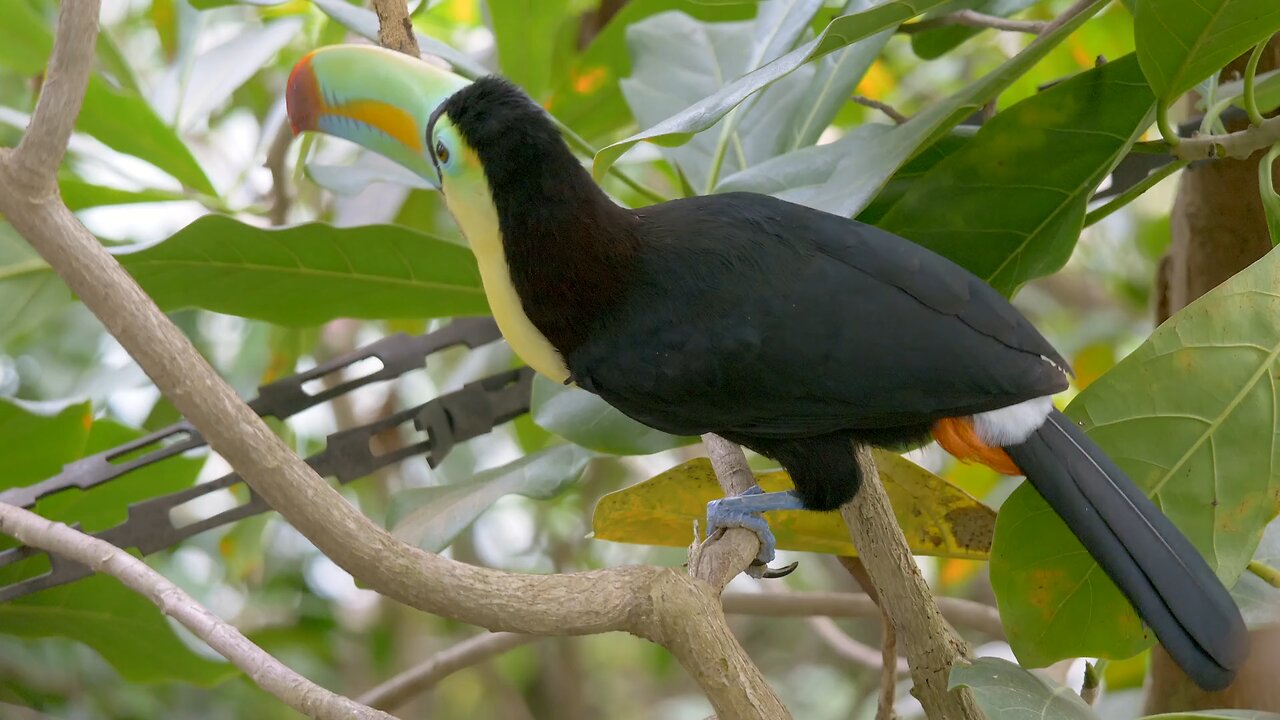Premium Only Content

"Keel-Billed Toucan: The Beak that Paints the Jungle"
The keel-billed toucan (*Ramphastos sulfuratus*), also known as the rainbow-billed toucan, is a strikingly colorful bird native to the tropical forests of Central and South America, particularly from southern Mexico to northern Colombia and Venezuela. This species is famous for its large, multicolored beak, which can grow up to one-third the length of its body, making it one of the most distinctive features of any bird species.
### Key Features:
- **Beak**: The keel-billed toucan’s beak is a vivid blend of colors, typically featuring green, orange, red, and blue. Despite its size and appearance, the beak is surprisingly lightweight, made of keratin with hollow structures that reduce its weight, allowing the bird to carry it effortlessly.
- **Size and Appearance**: These toucans are medium-sized birds, typically measuring about 42 to 55 cm (16.5 to 21.5 inches) in length, including the beak. They have black plumage with a bright yellow throat and chest, blue feet, and red under-tail feathers.
- **Habitat**: Keel-billed toucans inhabit tropical and subtropical rainforests, often residing in the canopies. They are highly adapted to life in trees, where they find food, shelter, and breeding sites.
- **Diet**: Their diet primarily consists of fruit, but they are omnivores and may also consume insects, eggs, and small reptiles. Their long beak allows them to reach fruit on branches too thin to support their weight.
- **Behavior**: Keel-billed toucans are social birds, often seen in small flocks. They communicate with each other using a variety of sounds, including croaks and rattles. They are also known for their playful behavior, which includes tossing fruit to each other.
- **Reproduction**: These birds nest in tree cavities, where the female lays 2-4 eggs. Both parents share the responsibility of incubating the eggs and feeding the chicks once they hatch.
- **Conservation Status**: The keel-billed toucan is currently listed as a species of Least Concern by the IUCN, but it faces threats from habitat loss due to deforestation and the illegal pet trade.
The keel-billed toucan’s vibrant appearance and charismatic behavior make it a popular symbol of tropical forests and a favorite among bird enthusiasts and conservationists alike.
-
 10:17
10:17
Dermatologist Dr. Dustin Portela
2 days ago $17.24 earnedOlay Cleansing Melts: Dermatologist's Honest Review
127K10 -
 1:02:20
1:02:20
Trumpet Daily
2 days ago $39.71 earnedObama’s Fake World Comes Crashing Down - Trumpet Daily | Dec. 20, 2024
85.1K58 -
 6:29
6:29
BIG NEM
1 day agoCultivating God Mode: Ancient Taoist NoFap Practices
63.2K13 -
 30:53
30:53
Uncommon Sense In Current Times
2 days ago $10.66 earned"Pardon or Peril? How Biden’s Clemency Actions Could Backfire"
77.9K5 -
 40:01
40:01
CarlCrusher
1 day agoSkinwalker Encounters in the Haunted Canyons of Magic Mesa - ep 4
72.4K7 -
 59:44
59:44
PMG
2 days ago $9.71 earned"BETRAYAL - Johnson's New Spending Bill EXPANDS COVID Plandemic Powers"
74.2K46 -
 6:48:50
6:48:50
Akademiks
1 day agoKendrick Lamar and SZA disses Drake and BIG AK? HOLD UP! Diddy, Durk, JayZ update. Travis Hunter RUN
193K34 -
 11:45:14
11:45:14
Right Side Broadcasting Network
10 days agoLIVE REPLAY: TPUSA's America Fest Conference: Day Three - 12/21/24
377K31 -
 12:19
12:19
Tundra Tactical
1 day ago $13.55 earnedDaniel Penny Beats Charges in NYC Subway Killing
83.6K16 -
 29:53
29:53
MYLUNCHBREAK CHANNEL PAGE
2 days agoUnder The Necropolis - Pt 1
169K85